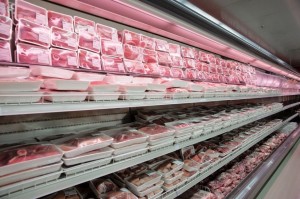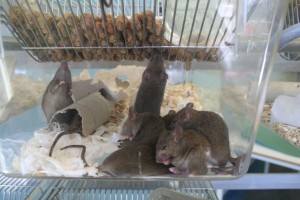Worldlog Settimana 50 – 2014
Recentemente l’indagine di Chatham House l’ha confermato: è necessario mangiare meno carne in modo da fermare i cambiamenti climatici. Il settore dell’allevamento del bestiame a livello mondiale produce più gas che tutti gli aerei, macchine, treni e barche insieme. Per prevenire un cambio climatico catastrofico, dovremo diminuire drasticamente il nostro consumo di proteine animalesche. La domanda di carne continua però a crescere a livello mondiale.

Ho quindi chiesto al governo la settimana scorsa, di fare un dibattito sul clima per disegnare un programma per diminuire il consumo di carne e lattici. Se nei Paesi Bassi mangiamo tutti meno carne per un giorno alla settimana, avrà lo stesso effetto rispetto a togliere un milione di macchine dalle strade. Cliccate qui per ulteriori informazioni. Al momento i Paesi Bassi lavorano per esportare la carne e i lattici alle economie emergenti. Nel frattempo abbiamo invece molta conoscenza ed esperienza per preparare i paesi a rischio di alluvioni. Sarebbe meglio esportare soluzioni climatiche invece che problemi climatiche!
Mozioni precedenti per vietare i veleni agricolturali non sono state per il momento eseguite. Questa settimana il Partito per gli Animali ha quindi presentato un piano per togliere questi veleni dal mercato. Una petizione che chiedeva questa cosa ha già raccolto oltre 62.000 firme. Il governo ha promesso di riguardarci. Speriamo che arrivino presto con delle action…
Una buona notizia! Con l’imminente capo d’anno so ricomincia a discutere sui fuochi artificiali. Almeno 20 comuni hanno già detto di istallare delle zone prive di fuochi artificiali intorno a case di cura e posti dove vi sono molti animali. Il Partito per gli Animali continua a chiedere un divieto ai fuochi artificiali.

I fuochi artificiali non sono l’unica tradizione festiva che inquina l’ambiente nei Paesi Bassi. Questa settimana abbiamo chiesto al governo di scoraggiare attivamente l’utilizzo di palloncini in pubblico. Il segretario ha espresso di essere pronto a farlo. I palloncini rimangono nella natura dopo essere utilizzati, contribuiscono alla zuppa di plastica negli oceani e viene visto dagli animali come cibo.
Ho anche fatto delle domande alla Camera sulla differenza tra le regole sulla caccia nelle varie provincie. Al momento è organizzato a livello provinciale, consentendo in alcune provincie delle regole che permettono una caccia che fa star male agli animali. Ho chiesto di avere un regime di tutela uniforme nella nuova Legge sulla Natura, che sarà in vigore dal 1 gennaio 2015 nei Paesi Bassi.
L’anno scorso sono stati sacrificati 450.000 animali per la manipolazione genetica nei Paesi Bassi. Si tratta di un aumento del 12,7 percento rispetto a 2012. Sono stati uccisi in totale 1,1 milione di animali nel 2013. Sono veramente troppi! Abbiamo quindi chiesto di finire la manipolazione genetica degli animali. E’ necessario ridurre il numero di sperimentazioni con gli animali. Gli scienziati hanno dimostrato che il ben 80% delle sperimentazioni con gli animali non raggiungono i criteri base per una ricerca scientifica solida. Bisogna cancellare il prima possibile tutte queste sperimentazioni!
It was recently again confirmed by a research by think tank Chatham House: eating less meat is needed to stop climate change. Worldwide livestock farming emits more greenhouse gasses than all cars, aircrafts, trains and vessels put together. In order to prevent a catastrophic climate change, we need to reduce our consumption of animal proteins drastically. But the global demand for meat is still growing strongly.
Last week, during a debate on our climate I asked our government to establish a policy for reducing the consumption of meat and dairy products. If everyone in the Netherlands was to abstain from eating meat for one day a week, it would have the same effect as if we would take one million cars off the road. Click here for more information.
At this moment, the Netherlands, as an exporting country, is working hard on forcing its meat and dairy products on emerging economies, while the Netherlands has great knowledge to help countries to withstand floods. We should rather export climate solutions than climate problems!
Previously adopted motions to ban some harmful types of agrotoxics have not been carried out until now. For that reason, the Party for the Animals presented an action plan this week to take those toxics off the market. A petition asking for this has meanwhile been signed by more than 62,000 people. The government has promised to look at it again. Let’s hope they will soon take measures.
Good news! With new year’s eve coming soon, the issue of fireworks is very topical again. Already 20 municipalities have said to make fireworks free zones in the area of nursing homes and places where animals are kept among other locations. The Party for the Animals continues to support the ban on fireworks for private use.
Fireworks is not the only environmental harmful festive tradition in the Netherlands. This week we have called the government to actively discourage sending up balloons. The State Secretary said to be willing to do so. Balloons and ribbons end up as litter in the environment after they have been send up, contributing to the plastic soup in oceans and they are seen as food by animals.
I also asked parliamentary questions about the differences in hunting policies between the provinces. It’s arranged differently in each of the provinces, making the use of animal-unfriendly hunting methods possible in some of them. I have asked for more uniform conservation measures in the new Nature Law, starting on the 1st of January 2015.
Last year, 450,000 test animals were sacrificed for genetic engineering, an increase of 12.7 per cent in comparison to 2012. In total 1.1 million animals were killed in 2013. Much too many! That’s why we called for a ban on the genetic modification of animals. This is necessary to cut back the number of animal tests. Scientists have indicated that 80% of the animal tests fail to meet the basic conditions for good scientific research. Al these tests should be banned as soon as possible!
Until soon! Greetings, Marianne
